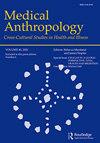研究、艾滋病毒/艾滋病以及将印度尼西亚的瓦里亚人转变为关键人口:人种学口述历史》。
IF 1.2
3区 社会学
Q2 ANTHROPOLOGY
引用次数: 0
摘要
艾滋病毒/艾滋病的历史往往是从全球北方开始讲述的,这种观点在以生物医学模式进行治疗和预防的政策和计划中已自然化。本文探讨了自 20 世纪 80 年代以来,被称为 Waria 的印尼变性人群体如何成为各种形式研究的主题。研究是 waria 被归类为 "变性人 "这一关键人群的一种方式。通过 2021/2022 年开展的一个口述历史项目,我们展示了对其他艾滋病毒/艾滋病历史的人种学描述是如何重新思考基本的全球健康概念的--虽然必然是分等级的。本文章由计算机程序翻译,如有差异,请以英文原文为准。
Research, HIV/AIDS, and Turning Waria into a Key Population in Indonesia: An Ethnographic Oral History.
The history of HIV/AIDS is often told from the Global North, a viewpoint that is naturalized in policies and programs that privilege biomedical models of treatment and prevention. This article explores how one Indonesian transgender population known as waria became the subject of various forms of research since the 1980s. Research was one way that waria came to be classified as part of the key population of "transgender people." Drawing on an oral history project conducted in 2021/2022, we show how - while necessarily hierarchical - ethnographic accounts of other HIV/AIDS histories can rethink fundamental global health concepts.
求助全文
通过发布文献求助,成功后即可免费获取论文全文。
去求助
来源期刊

Medical Anthropology
Multiple-
CiteScore
4.10
自引率
4.30%
发文量
57
期刊介绍:
Medical Anthropology provides a global forum for scholarly articles on the social patterns of ill-health and disease transmission, and experiences of and knowledge about health, illness and wellbeing. These include the nature, organization and movement of peoples, technologies and treatments, and how inequalities pattern access to these. Articles published in the journal showcase the theoretical sophistication, methodological soundness and ethnographic richness of contemporary medical anthropology. Through the publication of empirical articles and editorials, we encourage our authors and readers to engage critically with the key debates of our time. Medical Anthropology invites manuscripts on a wide range of topics, reflecting the diversity and the expanding interests and concerns of researchers in the field.
 求助内容:
求助内容: 应助结果提醒方式:
应助结果提醒方式:


